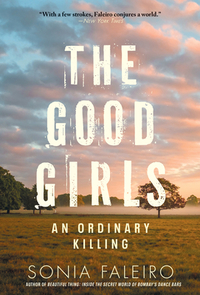Take a photo of a barcode or cover
dark
informative
medium-paced
dark
emotional
informative
tense
fast-paced
dark
informative
reflective
sad
medium-paced
dark
informative
relaxing
fast-paced
This book has been written with utmost caution. The author has tried to incorporate perspectives from different stakeholders. The book clearly shows how different factors interact in the lives of ordinary women in India. 70% of Indians still live in villages and the mainstream media covers only less than 1% of news from a village. This is in sharp contrast to what is being fed by the media as the new India. A balanced way of putting down things.
dark
informative
medium-paced
A more detailed review is up on my YouTube channel: https://youtu.be/akivu0fLzpc
In the summer of 2014, in the Badaun district of Uttar Pradesh, just a few hours away from the nation’s capital, two girls were reported missing. In the morning, their bodies were found hanging from a tree. The image of the two young girls hanging from a tree is seared into a lot of people’s memories. We may not remember it as often, but it is hard to forget.
Two young girls - renamed Padma and Lalli, 16 and 14 years of age, had gone to defecate in the fields and never returned. A search party was sent out and it was said that a young boy by the name of Pappu had kidnapped them. However, as day broke, the two bodies of the girls were found hanging from a tree in an orchard.
The book itself reads like an actual crime thriller with it chronologically telling us the story with a lot of reveals and twists in the tale. And trust me there were A LOT! With the shoddy job by the police, the unreliable and contrasting witness statements, there was just a lot happening in this case. (in a good way for us readers, in a not so good way for the people dealing with it)
I also really appreciated how this book not only told us just about the crime but also about cases relevant to the ongoing procedures of the crime and more. It also gave you an insight to society - especially the way things work in rural Uttar Pradesh and their thoughts in terms of women, politics, etc. So in the end, you learnt not only about the case itself but of so many other things that shape our nation.
I found the book to be super educational and informative. I also found it to be fast paced and extremely well written - the writing was simple and it kept you hooked. Definitely recommend it.✨
I was given this book in exchange for an honest review by the publisher.
In the summer of 2014, in the Badaun district of Uttar Pradesh, just a few hours away from the nation’s capital, two girls were reported missing. In the morning, their bodies were found hanging from a tree. The image of the two young girls hanging from a tree is seared into a lot of people’s memories. We may not remember it as often, but it is hard to forget.
Two young girls - renamed Padma and Lalli, 16 and 14 years of age, had gone to defecate in the fields and never returned. A search party was sent out and it was said that a young boy by the name of Pappu had kidnapped them. However, as day broke, the two bodies of the girls were found hanging from a tree in an orchard.
The book itself reads like an actual crime thriller with it chronologically telling us the story with a lot of reveals and twists in the tale. And trust me there were A LOT! With the shoddy job by the police, the unreliable and contrasting witness statements, there was just a lot happening in this case. (in a good way for us readers, in a not so good way for the people dealing with it)
I also really appreciated how this book not only told us just about the crime but also about cases relevant to the ongoing procedures of the crime and more. It also gave you an insight to society - especially the way things work in rural Uttar Pradesh and their thoughts in terms of women, politics, etc. So in the end, you learnt not only about the case itself but of so many other things that shape our nation.
I found the book to be super educational and informative. I also found it to be fast paced and extremely well written - the writing was simple and it kept you hooked. Definitely recommend it.✨
I was given this book in exchange for an honest review by the publisher.
Graphic: Child death, Death
Moderate: Sexism
adventurous
challenging
dark
sad
slow-paced
dark
informative
sad
medium-paced
This non-fiction book follows the stories of two teenage girls in Uttar Pradesh, India in 2014, who disappeared one night and were found hanging from a tree the next morning. The family, having no faith in the local police, refused to allow the bodies to be taken down in order to gain national media attention and demand justice for their children. The ensuing months led to a battle on understanding the events that took place, and a focus on ideas of gender, sex, honour and violence throughout India.
This was a hauntingly sad case to read about which will leave you more informed on the position of women around the world and the gender oppression that has existed and still exists. The author uses this one case of Padma and Lalli as a way to illuminate larger issues of sexual violence, caste issues, and the problems of the corrupt and incompetent police force, medical field, and government.
The book reads almost like non-fiction with the way the story is unravelled. It really comes across that the author has covered all bases in terms of interviewing the family of the victims and the accused, the police, reporters, neighbours and extended family, the medical team and more. There is a lot of information throughout this book and it could be hard to comprehend with all the various names, politics, and places that were mentioned, but in a way, this felt like a reflection of the complexity of fixing the issues prevalent in India.
My heart broke for Padma and Lalli, but I came away from this book with a better understanding of the issues faced by women around the world. I was moved, hurt and angry, but I am more educated for it, and I would recommend this book to others on this basis.
This was a hauntingly sad case to read about which will leave you more informed on the position of women around the world and the gender oppression that has existed and still exists. The author uses this one case of Padma and Lalli as a way to illuminate larger issues of sexual violence, caste issues, and the problems of the corrupt and incompetent police force, medical field, and government.
The book reads almost like non-fiction with the way the story is unravelled. It really comes across that the author has covered all bases in terms of interviewing the family of the victims and the accused, the police, reporters, neighbours and extended family, the medical team and more. There is a lot of information throughout this book and it could be hard to comprehend with all the various names, politics, and places that were mentioned, but in a way, this felt like a reflection of the complexity of fixing the issues prevalent in India.
My heart broke for Padma and Lalli, but I came away from this book with a better understanding of the issues faced by women around the world. I was moved, hurt and angry, but I am more educated for it, and I would recommend this book to others on this basis.
dark
sad
medium-paced
In 2014 two young teenage girls, fourteen-year-old Lalli and sixteen-year-old Padma, go missing one evening in the Indian state of Uttar Pradesh. The girls were cousins and very close and had been to a local fair that day. A relative went to the families and told them that he had seen the girls talking to a boy from the next hamlet, and that he had been threatened with a gun and several men had taken the girls away. Their families went out looking for them, but their bodies were eventually found hanging from a tree in the orchard. What happened next sees witness stories changing and strange behaviour by some involved in the case, and it underlines the way in which different castes are treated in Indian society and by the law, and what seems like indifference of the system to crimes which mainly affect women and girls. All this is further complicated by the practice of honour killings.
This was an informative read especially if, like me, the reader knows little of the workings of law and society in India. It is a difficult read emotionally to find out what happened to the girls and the whole case is very sad. It feels as if rights for women and girls are going backwards in all areas of the world. The book did become a little unstructured at times and that affected my ability to concentrate on some areas, but it has left me feeling that I need to read more about the subjects involved, which is always a good thing.
Thank you to NetGalley and publishers, Bloomsbury Publishing PLC (UK & ANZ), for the opportunity to read an ARC. I am voluntarily giving an honest review.
This was an informative read especially if, like me, the reader knows little of the workings of law and society in India. It is a difficult read emotionally to find out what happened to the girls and the whole case is very sad. It feels as if rights for women and girls are going backwards in all areas of the world. The book did become a little unstructured at times and that affected my ability to concentrate on some areas, but it has left me feeling that I need to read more about the subjects involved, which is always a good thing.
Thank you to NetGalley and publishers, Bloomsbury Publishing PLC (UK & ANZ), for the opportunity to read an ARC. I am voluntarily giving an honest review.
Moderate: Child death
I received this book from the publishers via NetGalley in exchange for an honest review.
In 2014, two young girls from a village in Utar Pradesh were reported missing. Their bodies were later found hanging from a tree in a nearby orchard and their families refused to move them, proclaiming the girls raped and murdered.
In The Good Girls, Sonia Faleiro takes a look at the case of the girls she names Padma and Lalli and where everything went wrong with their case from the very start, from the moment they took too long to come back from the fields they used for their toilet. The book also acts as a lens into the way sexual assault is viewed in India, and how difficult it still is to fairly investigate and charge culprits for.
What I appreciated about this book is the real look it took into how girls are treated in India, and i particular the poorer villages and families in India. A girl's honor is everything - to the point that when it was deemed Padma and Lalli had most likely died by suicide, people thought to themselves, "well, how could they have LET themselves live" after certain aspects of the case and potential sexual relationships came to light.
"And so, just like that, in less than an hour since they were gone, Padma was no longer the quick-tempered one. Lalli was no longer the faithful partner in crime. Who they were, and what had happened to them, was already less important than what their disappearance meant to the status of the people left behind."
It also is such an eye-opener on how so many people still live today and it's heartbreaking. Truly. There were times I woudl forget these events only took place 6 years ago because the way people lived felt like decades, if not a century ago. The poverty, the lack of education, the stifling and control of young women (for example it's improper for a girl to talk on a mobile phone?!), was just so backward.
I don't think this book was structured as well as it could have been. It felt a bit all over the place for me at times but I do have to point out that the author was dealing with a lot of reports and information - of which there were a lot of contradictory statements (the main eyewitness changed his statement a number of times, and still doesn't really seem to know what he actually saw that night).
There's also a bit in here around the Indian caste system and some Indian politics which is just a minefield, even if you do know a bit about it. So that was something that left my brain feeling jumbled.
I'm honestly not 100% sure if I'd recommend it to everyone to read - I think some people will like and others will be turned off by how all over the place the story and the case is.
In 2014, two young girls from a village in Utar Pradesh were reported missing. Their bodies were later found hanging from a tree in a nearby orchard and their families refused to move them, proclaiming the girls raped and murdered.
In The Good Girls, Sonia Faleiro takes a look at the case of the girls she names Padma and Lalli and where everything went wrong with their case from the very start, from the moment they took too long to come back from the fields they used for their toilet. The book also acts as a lens into the way sexual assault is viewed in India, and how difficult it still is to fairly investigate and charge culprits for.
What I appreciated about this book is the real look it took into how girls are treated in India, and i particular the poorer villages and families in India. A girl's honor is everything - to the point that when it was deemed Padma and Lalli had most likely died by suicide, people thought to themselves, "well, how could they have LET themselves live" after certain aspects of the case and potential sexual relationships came to light.
"And so, just like that, in less than an hour since they were gone, Padma was no longer the quick-tempered one. Lalli was no longer the faithful partner in crime. Who they were, and what had happened to them, was already less important than what their disappearance meant to the status of the people left behind."
It also is such an eye-opener on how so many people still live today and it's heartbreaking. Truly. There were times I woudl forget these events only took place 6 years ago because the way people lived felt like decades, if not a century ago. The poverty, the lack of education, the stifling and control of young women (for example it's improper for a girl to talk on a mobile phone?!), was just so backward.
I don't think this book was structured as well as it could have been. It felt a bit all over the place for me at times but I do have to point out that the author was dealing with a lot of reports and information - of which there were a lot of contradictory statements (the main eyewitness changed his statement a number of times, and still doesn't really seem to know what he actually saw that night).
There's also a bit in here around the Indian caste system and some Indian politics which is just a minefield, even if you do know a bit about it. So that was something that left my brain feeling jumbled.
I'm honestly not 100% sure if I'd recommend it to everyone to read - I think some people will like and others will be turned off by how all over the place the story and the case is.






